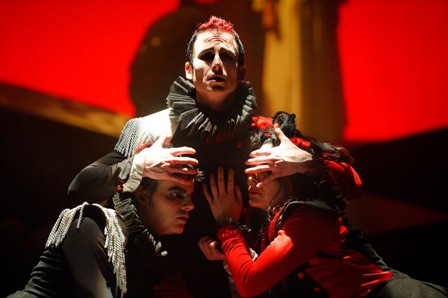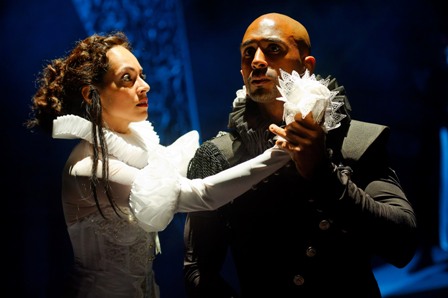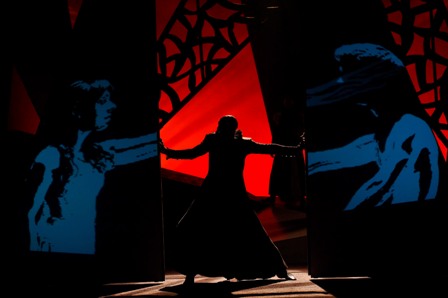Ambition. Envy. Lust.
This is the triple-headed monster that drives one of Shakespeare’s most explored villians, the manipulative yet seductive Iago whose knowledge of his rivals’ secrets and fears are the keys to a devious plot. His motivation being so multi-faceted and open to different interpretations, he tends to grasp control of a play that is, after all, named for another character. It’s an issue every production has to face – do you focus on the monster or the hero?
Now through July 3 you can witness how effectively Synetic Theater tackles this issue with their take on Othello. It’s their sixth wordless Shakespeare production – I thought they had reached the pinnacle with their last outing, Antony and Cleopatra, but clearly there’s no end to the brilliance of this company when it applies its physical theater style to the Bard. Hyperbole? Head to the Kennedy Center’s Family Theater and judge for yourself.
Here Othello’s polished veneer of self-control masks a deep wound into which Iago writhes like a parasite, whereas Iago’s wound is shown to us right from the start. As they are so entwined, they are equally the focus. This is a production marked by psychic pain so palpable it made me shake. It’s also fast, frenzied and exquisite.

Alex Mills, Philip Fletcher and Irina Tsikurishvili as Iago in Synetic Theater's production of "Othello." Photo credit: Graeme B. Shaw
Othello is one of the most read of Shakespeare’s plays, the story of a Moor adopted by the Venetian society he saved only to lose everything through the machinations of an envious rival. His moments of triumph are at another man’s expense, his lieutenant Iago, whose conflicting emotions about his superior – does he love Desdemona, the Moor’s wife? does he love Othello himself? is it Iago’s wife who really had the affair? is it purely thwarted ambition that drives him to evil? – are here brilliantly portrayed by having him split into three parts in a riveting mirror madness scene. Instead of complicating his motivation, this choice clarifies it in a daring way. Philip Fletcher, Alex Mills and Irina Tsikurishvili (also choreographer) become manifestations of Iago’s ambition, lust and envy as the agents of Othello’s downfall.
Othello may be the saviour of Venice, but in this production he is haunted by his past as a slave, having lost a loved one in captivity whose handkerchief becomes the symbol of pure love that he passes on to the delicate Desdemona, his wife (in the text it belonged to his mother, here it seems a first wife or lover). As Iago’s plot to disgrace Desdemona and bring about Othello’s downfall twists around him, Othello’s carefully constructed veneer of control and nobility begin to crack until he is consumed by jealousy and fear of betrayal.
This is a hard journey to portray, but it was truly frightening to watch Roger Payano embody Othello as he is paralyzed by cold hard rage, only his sad eyes remaining to remind you of his noble spirit. Many times that jealousy is overdone by actors, but here the frenzied moment he is driven mad by images of his wife’s supposed infidelity is spot on. When he decides to end her life, simply twisting that fatal handkerchief into a garrotte, I couldn’t help but cry.

Salma Shaw as Desdemona and Roger Payano as Othello in Synetic Theater's production of "Othello." Photo credit: Graeme S. Shaw
It’s one of many seemingly small gestures that denote an ensemble at the top of its game – Irina Koval as Iago’s complicated wife Emilia, tossing the handkerchief with contempt after an athletic sex bout, Irina Tsikurishvili’s shoulders shrugging off blame, Philip Fletcher’s hand aching to caress, Salma Shaw’s eyes as Desdemona pleads not just for her life but her husband’s soul – flawless choices that bring the audience into the world of the play.
That world is another triumph of design for Synetic. The choice of three Iagos is mirrored by the color scheme of black, white and red that predominates the set and costumes. Anastasia R. Simes has outdone herself here with a gorgeous design that somehow made me think of a Jean Cocteau film set in an Italian industrial nightclub. There are touches of yellow given to Iago’s hapless stooge Rodrigo (a sad clown lovingly played by Vato Tsikurishvili). Cruel blue greys illuminate the lurid projections Iago uses to poison Othello’s mind, images of hands and eyes as the instruments of betrayal. Hand lights alternate cleverly as flashlights or cameras, reinforcing the paranoid sense that actions are always being watched to be twisted to other evil ends. All is beautifully illuminated or hidden by Andrew F. Griffin’s lighting design, as secrets of inner passions are alternately revealed or concealed.
Though this production does clearly place Othello as a former slave by virtue of a painfully explicit opening sequence, without the text Othello loses its biting exchanges on racial prejudice and hatred, becoming more about the evils of unbridled ambition and the madness of jealousy. I’m curious if other audience members will miss that element. However the gain of Synetic’s style with this particular play is the return of raucous sexual vulgarity so often missing from more reverential treatments – there’s no doubt that lust, ambition and envy are the engines of the action, not prejudice. It feels very elemental and universal. We all know these emotions – whether or not we act on them, well, that’s another secret.
Othello
Synetic Theater
at the John F. Kennedy Center for Performing Arts
2700 F Street NW
Washington, DC 20566
Tickets 800.444.1324 or online



Pingback: Tweets that mention We Love Arts: Othello » We Love DC -- Topsy.com
Made me want to go to my bookself and read Othello again…would love to see this production.
Pingback: Othello - Synetic Theater — Part-time MBA Degree in DC
The last Synetic outing was Metamorphosis…
Drew, yes, Metamorphosis (also reviewed here by me) was Synetic’s production before Othello, but it was not their last wordless Shakespeare outing, which was what I was referring to in that paragraph. Thanks for the comment, hope this clarifies my intent.
I, too missed the element of racial prejudice–a strong element of the story. If Desdemona had been a blonde, in contrast with everyone else on stage, the inference might have been implied .